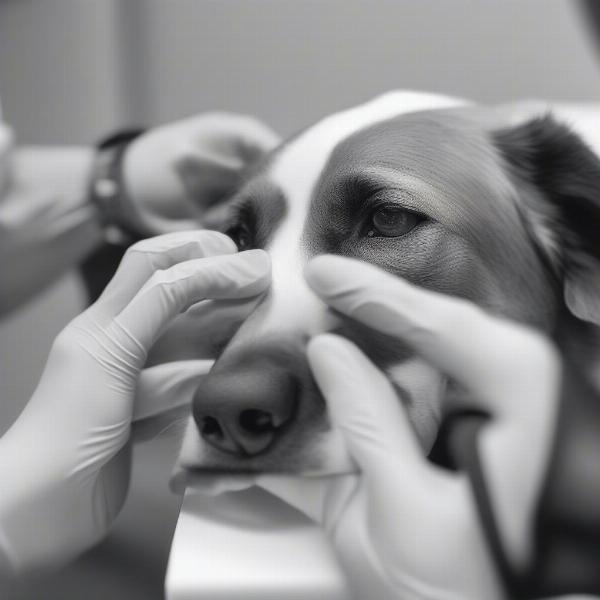After surgery, it’s common for dogs to experience a decreased appetite and thirst. While this is usually temporary, it can be concerning, especially when your dog won’t drink water. Dehydration can hinder recovery, so it’s crucial to address this issue promptly and effectively. This article will guide you through the reasons why your dog might not be drinking after surgery, offer practical tips to encourage hydration, and advise when to seek veterinary attention.
Understanding Post-Surgical Dehydration in Dogs
Several factors can contribute to your dog’s reluctance to drink water after surgery. Pain and discomfort are often the primary culprits. Anesthesia can also cause nausea and a dry mouth, further reducing their desire to drink. Certain medications can also impact thirst. Moreover, the unfamiliar environment and stress associated with the surgery can play a role. Finally, the surgery itself, particularly if it involved the mouth or throat, can make drinking painful or difficult.
Encouraging Your Dog to Drink Water
Getting your dog to drink after surgery requires patience and a gentle approach. Try offering small amounts of fresh water frequently. A shallow bowl might be easier for them to access than a deep one. Some dogs prefer ice chips, which can be soothing if their mouth is sore. You can also try adding a small amount of low-sodium chicken broth or bone broth to the water to make it more appealing. Wetting their food can also increase their fluid intake.
Using a Syringe to Hydrate Your Dog
If your dog is still reluctant to drink, you can try using a syringe (without the needle) to gently squirt small amounts of water into their mouth. Be careful not to force the water, as this could cause choking. Aim for the side of their mouth, allowing them to swallow at their own pace.
When to Contact Your Veterinarian
While a temporary decrease in water intake is normal, prolonged dehydration can be serious. Contact your veterinarian if your dog hasn’t drunk any water for 24 hours after surgery, or if you notice signs of dehydration such as lethargy, dry gums, sunken eyes, or loss of skin elasticity. Also, consult your vet if your dog is vomiting, has diarrhea, or shows any other signs of illness.
 Veterinarian examining a dog
Veterinarian examining a dog
Monitoring Your Dog’s Recovery
Closely monitor your dog’s overall recovery. Ensure they are resting comfortably and following their veterinarian’s post-operative instructions. Keep their surgical site clean and dry. If you notice any changes in their behavior, appetite, or thirst, don’t hesitate to contact your veterinarian.
Conclusion
A dog not drinking water after surgery can be worrying, but with patience and the right approach, you can encourage them to rehydrate. Remember to offer fresh water frequently, make it easily accessible, and consider adding flavoring. If your dog continues to refuse water or shows signs of dehydration, contact your veterinarian immediately. Their guidance is crucial for ensuring your furry friend’s safe and speedy recovery.
FAQ
- How long is it normal for a dog to not drink water after surgery? A slight decrease in thirst for 24 hours is generally considered normal.
- What are the signs of dehydration in dogs? Lethargy, dry gums, sunken eyes, loss of skin elasticity, and decreased urination.
- Can I give my dog ice chips after surgery? Yes, ice chips can be soothing and encourage hydration.
- Should I force my dog to drink water? No, forcing water can cause choking. Offer it gently and frequently.
- When should I call the vet if my dog isn’t drinking? If your dog hasn’t drunk any water for 24 hours, or shows any signs of dehydration or illness.
- What can I add to my dog’s water to make it more appealing? A small amount of low-sodium chicken broth or bone broth.
- How can I make it easier for my dog to drink? Use a shallow bowl or offer water in a syringe.
Internal Links:
Regular check-ups are important for maintaining your dog’s health. Learn more about the benefits of a dog cone after surgery. Sometimes, a cervical neck collar for dogs can be beneficial during recovery. It’s important to understand how a dog surgery collar can aid in healing. Further information about post-surgery care can be found in our article on dog not drinking water after surgery. Finally, learn more about caring for your pet after procedures by reading our guide on a grommet dog.
About ILM Dog:
ILM Dog is your trusted international resource for comprehensive dog care and wellbeing. We offer expert advice on everything from breed selection and health management to training, nutrition, and grooming. Whether you’re a seasoned dog owner or just starting your journey, ILM Dog provides practical and reliable information to help you provide the best possible care for your canine companion. Contact us for personalized support: email [email protected] or phone +44 20-3965-8624.